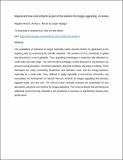| dc.description.abstract | The availability of pollutants in biogas especially carbon dioxide hinders its application in the enginery parts by minimizing its calorific standards. The presence of CO2 contributes to global warming which is a worry globally. Thus, upgrading technologies is needed for safe utilization on small-scale and wide-range. The commercial technologies mostly discussed in the literature are pressure swing adsorption, membrane separation, physical scrubbing, and water scrubbing. These techniques are costly concerning investment, and operation costs, and are energy-intensive, especially on a small scale. Thus, difficult to apply especially in low-income economies, and necessitates the development of natural, low-cost sorbents for biogas upgrading like biomass, eggshell waste, and clay soil. The current review critically evaluates the potentiality of new approaches using low-cost sorbents for biogas upgrading. The review proposed that activating and additional of pore-forming materials in the adsorbents is necessary to significantly enhance their performance. | en_US |

